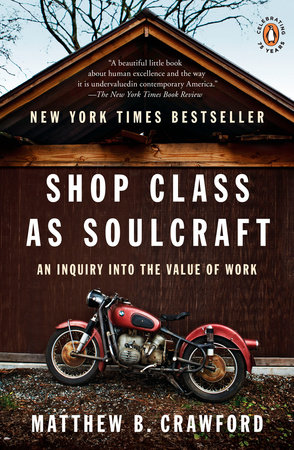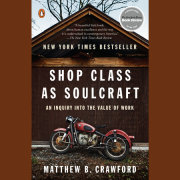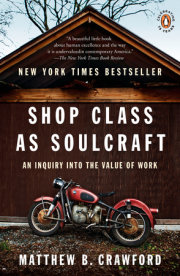Chapter 1
A Brief Case for the Useful Arts
[I]n schools, we create artificial learning environments for our children that they know to be contrived and undeserving of their full attention and engagement. . . . Without the opportunity to learn through the hands, the world remains abstract, and distant, and the passions for learning will not be engaged.
—DOUG STOWE, WISDOM OF THE HANDS (BLOG), OCTOBER 16, 2006
Tom Hull teaches welding, machine shop, auto shop, sheet metal work, and c computer-aided drafting at Marshfield High School in Coos Bay, Oregon. He is also president of the Technology Educators of Oregon. Asked about the current state of his profession, he says a lot of schools shut down their shop class programs in the 1990s, when there was a big push for computer literacy. To pay for the new computers, electives were cut. Shop was especially attractive as a target: it is expensive and potentially dangerous. Further, as Hull says, “you can’t shove fifty students at a time into a shop class, like you can a PE class.” In California, three-quarters of high school shop programs have disappeared since the early 1980s, according to the California Industrial and Technology Education Association.
There are efforts in North Carolina, Florida, and California to revive shop, but finding people competent to teach it has become difficult. “We have a generation of students that can answer questions on standardized tests, know factoids, but they can’t do anything,” according to Jim Aschwanden, executive director of the California Agricultural Teachers’ Association.
Meanwhile, people in the trades are constantly howling about their inability to find workers. The slack has been taken up to some extent by community colleges that offer shop class. Tom Thompson, of Oregon’s Department of Education, says there is anecdotal evidence to suggest that one of the fastest-growing segments of the student body at community colleges is people who already have a four-year degree and return to get a marketable trade skill. There are also for-profit schools such as Universal Technical Institute and Wyoming Technical Institute that draw students from around the country. Both graduate about 95 percent of their students, and about 98 percent of those who graduate get jobs in their first year after finishing.
Hull sends out a quarterly newsletter to the graduates of his shop programs. It is like a nineteenth-century almanac, a combination of useful information and intellectual inquiry, as well as examples of human uplift. The newsletter includes shop tips (for example, clever ways to clamp an irregularly shaped object in preparation for welding), book reviews, digressions on aesthetics, and success stories in which he profiles the careers of his former students. A recent issue featured Kyle Cox, a welder and fabricator for Tarheel Aluminum. Hull caught up with his former student as he fabricated an all-aluminum pile-d riving barge on the docks in Charleston. Cox says the job changes every day, and that’s what he loves about it. He also likes being “useful to the world.”
One of Hull’s recent columns reflected on the Fibonacci sequence, an infinite series of numbers where the ratio between adjacent pairs approaches a certain value known as the golden ratio, found throughout nature. Hull writes, “the sequence portrays a human characteristic as well, as the ratio is not immediately achieved, but gets closer and closer, and not by some steady slope to perfection but by
s elf-correcting oscillations” about the ideal value. This seems to capture the kind of iterated self criticism, in light of some ideal that is never quite attained, whereby the craftsman advances in his art. You give it your best, learn from your mistakes, and the next time get a little closer to the image you started with in your head. Hull clearly has a humanist’s view of what is now called “Career and Technical Education,” and plays a major role in the lives of his students. He says his work as a shop teacher is “the best job I can imagine.”
Many educators find their work fulfilling. Is there something about the useful arts in particular that can elicit such devotion? For one gets the sense that Hull takes himself to be pointing his students not just to a livelihood but to some more comprehensive view of what a good life looks like.
The Psychic Satisfactions of Manual Work I started working as an electrician’s helper shortly before I turned fourteen. I wasn’t attending school at that time and worked f ull-time until I was fifteen, then kept the trade up during the summers while in high school and college, with steadily increasing responsibility.3 When I couldn’t get a job with my college degree in physics, I was glad to have something to fall back on, and went into business for myself, in Santa Barbara.
I never ceased to take pleasure in the moment, at the end of a job, when I would flip the switch. “And there was light.” It was an experience of agency and competence. The effects of my work were visible for all to see, so my competence was real for others as well; it had a social currency. I was sometimes quieted at the sight of a gang of conduit entering a large panel in an industrial setting, bent into nestled, flowing curves, with varying offsets, that somehow all terminated in the same plane. This was a skill so far beyond my abilities that I felt I was in the presence of some genius, and the man who bent that conduit surely imagined this moment of recognition as he worked. As a residential and light-commercial electrician, most of my work got covered up inside walls. Still, I felt pride in meeting the aesthetic demands of a workmanlike installation. Maybe another electrician would see it someday. Even if not, I felt responsible to my better self. Or rather, to the thing itself—craftsmanship has been said to consist simply in the desire to do something well, for its own sake. If the primary satisfaction is intrinsic and private in this way, there is nonetheless a sort of s elf-disclosing that takes place. As the philosopher Alexandre Kojève writes,
The man who works recognizes his own product in the World that has actually been transformed by his work: he recognizes himself in it, he sees in it his own human reality, in it he discovers and reveals to others the objective reality of his humanity, of the originally abstract and purely subjective idea he has of himself.
The satisfactions of manifesting oneself concretely in the world through manual competence have been known to make a man quiet and easy. They seem to relieve him of the felt need to offer chattering
interpretations of himself to vindicate his worth. He can simply point: the building stands, the car now runs, the lights are on. Boasting is what a boy does, because he has no real effect in the world. But the tradesman must reckon with the infallible judgment of reality, where one’s failures or shortcomings cannot be interpreted away. His w ell-founded pride is far from the gratuitous “s elf-esteem” that educators would impart to students, as though by magic.
Many people would be reluctant to bestow the term “craftsmanship” on the work of an electrician, and reserve the word for those who make finely wrought objects. This seems a fair reservation, and I see no need to quarrel with it.5 My own experience in making craft objects is limited to that of a hobbyist, but is perhaps worth relating. People who make their own furniture will tell you that it is hard to justify economically, and yet they persist. Shared memories attach to the material souvenirs of our lives, and producing them is a kind of communion, with others and with the future. I once built a mahogany coffee table on which I spared no expense of effort. At that time I had no immediate prospect of becoming a father, yet I imagined a child who would form indelible impressions of this table and know that it was his father’s work. I imagined the table fading into the background of a future life, the defects in its execution as well as inevitable stains and scars becoming a surface textured enough that memory and sentiment might cling to it, in unnoticed accretions. More fundamentally, as Hannah Arendt writes, the durable objects of use produced by men “give rise to the familiarity of the world, its customs and habits of intercourse between men and things as well as between men and men.” “The reality and reliability of the human world rest primarily on the fact that we are surrounded by things more permanent than the activity by which they were produced, and potentially even more permanent than the lives of their authors.”
All material things turn to dust, ultimately, so perhaps “permanance” isn’t quite the right idea to invoke here. The moral significance of work that grapples with material things may lie in the simple fact that such things lie outside the self. A washing machine, for example, surely exists to serve our needs, but in contending with one that is broken, you have to ask what
it needs. At such a moment, technology is no longer a means by which our mastery of the world is extended, but an affront to our usual self- absorption. Constantly seeking self- affirmation, the narcissist views everything as an extension of his will, and therefore has only a tenuous grasp on the world of objects as something independent. He is prone to magical thinking and delusions of omnipotence. A repairman, on the other hand, puts himself in the service of others, and fixes the things they depend on. His relationship to objects enacts a more solid sort of command, based on real understanding. For this very reason, his work also chastens the easy fantasy of mastery that permeates modern culture. The repairman has to begin each job by getting outside his own head and noticing things; he has to look carefully and listen to the ailing machine.
The repairman is called in when the smooth operation of our world has been disrupted, and at such moments our dependence on things normally taken for granted (for example, a toilet that flushes) is brought to vivid awareness. The repairman’s presence may make the narcissist uncomfortable, then. The problem isn’t so much that he is dirty, or uncouth. Rather, he seems to pose a challenge to our self-understanding that is somehow fundamental. We’re not as free and independent as we thought. Street level work that disrupts the infrastructure (the sewer system below or the electrical grid above) brings our
shared dependence into view. People may inhabit very different worlds even in the same city, according to their wealth or poverty. Yet we all live in the same physical reality, ultimately, and owe a common debt to the world.
Because craftsmanship refers to objective standards that do not issue from the self and its desires, it poses a challenge to the ethic of consumerism, as the sociologist Richard Sennett argued in
The Culture of the New Capitalism. The craftsman is proud of what he has made, and cherishes it, while the consumer discards things that are perfectly serviceable in his restless pursuit of the new.8 The craftsman is then more possessive, more tied to what is present, the dead incarnation of past labor; the consumer is more free, more imaginative, and so more valorous according to those who would sell us things. Being able to think materially about material goods, hence critically, gives one some independence from the manipulations of marketing, which as Sennett points out typically divert attention from
what a thing is to a backstory intimated through associations, the point of which is to exaggerate minor differences between brands. Knowing the production narrative, or at least being able to plausibly imagine it, renders the social narrative of the advertisement less potent. The craftsman has an impoverished fantasy life compared to the ideal consumer; he is more utilitarian and less given to soaring hopes. But he is also more independent.
This would seem to be significant for any political typology. Political theorists from Aristotle to Thomas Jefferson have questioned the republican virtue of the artisan, finding him too narrow in his concerns to be moved by the public good. Yet this assessment was made before the full flowering of mass communication and mass conformity, which pose a different set of problems for the republican character: enervation of judgment and erosion of the independent spirit. If the modern personality is being reorganized on a predicate of passive consumption, this is bound to affect our political culture.
Since the standards of craftsmanship issue from the logic of things rather than the art of persuasion, practiced submission to them perhaps gives the craftsman some psychic ground to stand on against fantastic hopes aroused by demagogues, whether commercial or political. Plato makes a distinction between technical skill and rhetoric on the grounds that rhetoric “has no account to give of the real nature of things, and so cannot tell the cause of any of them.”9The craftsman’s habitual deference is not toward the New, but toward the objective standards of his craft. However narrow in its application, this is a rare appearance in contemporary life—a disinterested, articulable, and publicly affirmable idea of the good. Such a strong ontology is somewhat at odds with the cutting-edge institutions of the new capitalism, and with the educational regime that aims to supply those institutions with suitable workers— pliable generalists unfettered by any single set of skills.
Today, in our schools, the manual trades are given little honor. The egalitarian worry that has always attended tracking students into “college prep” and “vocational ed” is overlaid with another: the fear that acquiring a specific skill set means that one’s life is
determined. In college, by contrast, many students don’t learn anything of particular application; college is the ticket to an
open future. Craftsmanship entails learning to do one thing really well, while the ideal of the new economy is to be able to learn new things, celebrating potential rather than achievement. Somehow, every worker in the cutting-edge workplace is now supposed to act like an “intrapreneur,” that is, to be actively involved in the continuous redefinition of his own job. Shop class presents an image of stasis that runs directly counter to what Sennett identifies as “a key element in the new economy’s idealized self: the capacity to surrender, to give up possession of an established reality.” This stance toward “established reality,” which can only be called psychedelic, is best not indulged around a table saw. It is dissatisfied with what Arendt calls the “reality and reliability” of the world. It is a strange sort of ideal, attractive only to a peculiar sort of self—insecurity about the basic character of the world is no fun for most people.
As Sennett argues, most people take pride in being good at something specific, which happens through the accumulation of experience. Yet the flitting disposition is pressed upon workers from above by the current generation of management revolutionaries, for whom the ethic of craftsmanship is actually something to be rooted out from the workforce. Craftsmanship means dwelling on a task for a long time and going deeply into it, because you want to get it right. In management speak, this is called being “ingrown.” The preferred role model is the management consultant, who swoops in and out and whose very pride lies in his lack of particular expertise. Like the ideal consumer, the management consultant presents an image of soaring freedom, in light of which the manual trades appear cramped and paltry: the plumber with his butt crack, peering under the sink.
With such images in their heads, parents don’t want their children to become plumbers. Yet that filthy plumber under the sink might be charging somebody eighty dollars an hour. This fact
ought, at least, to induce an experience of cognitive dissonance in the parent who regards his child as smart and wants him to become a knowledge worker. If he accepts the basic premise of a knowledge economy that someone being paid a lot of money must
know something, he may begin to wonder what is really going on under that sink, and entertain a suspicion against the widely accepted dichotomy of knowledge work
versus manual work. In fact, that dichotomy rests on some fundamental misconceptions. I’d like to offer an alternative account, one that will give due credit to the cognitive richness of the skilled trades. In pursuing these questions, we arrive at insights that help to explain why work that is straightforwardly useful can also be intellectually absorbing.
Copyright © 2010 by Matthew B. Crawford. All rights reserved. No part of this excerpt may be reproduced or reprinted without permission in writing from the publisher.










